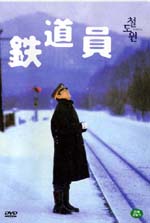|
|
| Title |
Poppoya-Railroad Man |
| Starring |
Ken Takakura, Shinobu Otake, Ryoko Hirosue
|
| Director |
Yasuo Furuhata
|
| Length |
112 min. |
| Detail |
Sub ไทย ปกสี หน้าหลัง |
| ราคา |
VCD 2 แผ่น 100 บาท
DVD -r 150 บาท |
| Preview |
|
|
|
|
Oto's father told him the railways would help rebuild Japan after the Second World War. He said his son should work on the railways. And his son, conscientious, dutiful, did so. He became a poppoya or railroad man, working first as an engineer, then as a stationmaster in the small town of Horomai. Now Japan has been rebuilt and the days of the trains are passing, and Oto finds himself obsolete, as the train line he has run for so many years with unwavering dedication will soon be closed. Oto's longtime friend and coworker is planning to work at a new resort hotel over the mountains; his adoptive brother-in-law plans to open an Italian restaurant. But Oto has never contemplated doing anything else. Now, in the station's last days, he reflects on the past: the movie takes place in the present, but is punctuated with flashbacks to key moments in Oto's life. He is a gruff, withdrawn man, punctilious but kind-hearted, who represents a certain kind of Japanese mentality: he is dedicated to public duty above all else. In this lies his sense of pride and honour. POPPOYA seems unsure whether to wax nostalgic about a simpler time when men such as Oto knew their role in life and abided by it or whether to mourn the personal privation that such a life entails (Oto attends neither the death-bed of his wife or his infant daughter because he will not leave the station during his shift). In the end, nostalgia wins out, as the movie closes with a nearly interminable sequence of cathartic moments, which indulge in excessive sentiment and tell us in no uncertain terms that Oto's a jolly good fellow after all. The approach is that of an old-fashioned tearjerker, and the movie as a whole is curiously old-fashioned, taking place in a small town which seems to have stalled in the 1950s and making much use of a cloyingly romantic orchestral score which swells over all the emotional climaxes. Perhaps director Yasuo Furuhata is nostalgic for the kind of movies that were made at the same time the railroads were being developed. However, compared to the diverse and exciting output of contemporary Japanese cinema, POPPOYA at times seems as irrelevant as Oto feels.
|
